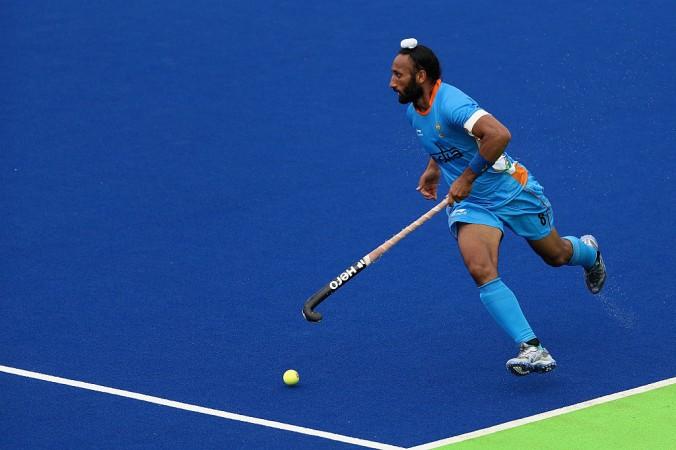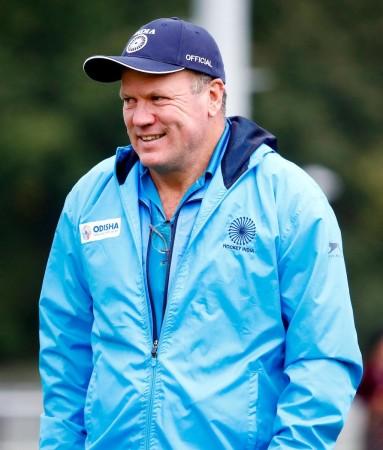
Patience is the keyword as India's hockey stars look to get back into the groove amid the restrictions that are in place due to the COVID-19 pandemic, according to men's national team coach Graham Reid. With the Olympics postponed to next year and no international commitments planned for this year, Reid's description of the ongoing national camp gives the impression of it being a rebuilding project.
The players have not played top-level international hockey since February and training has been all but non-existent since mid-March. Reid, however, prefers to look at the positive side of the situation.
Coach Graham Reid speaks on national camp and the Olympics
"The good part about the start of the national camp is that the Olympics is to played within 11 months. What this has done is push a reset button for everyone in the squad. For guys who didn't have the opportunities that others had, it gives them a chance as well. That was made pretty clear to everybody and that in itself is a good motivation factor," Reid told IANS from the Sports Authority of India's (SAI) southern centre near Bengaluru, where the camp is on.
"One train of thought is that if a player has been away from the top level for three months then it is going to take them three months to get back. So, going by that timeline, I am thinking another three months to get back to where they were."
The men's team was in good space before the start of the lockdown. India had made an impressive start to their FIH Pro League campaign and the players' respective form seemed to be on the up as the 2020 Tokyo Olympics approached. "Those two weeks of March was actually really good. The Olympics were still on, we were able to train where other teams were not," said Reid.
Eventually however, the Olympics, originally set to start on July 24 this year, got postponed to July 23, 2021, and the country went into a lockdown as the pandemic raged on accross the world. Sports calendars were rejigged and the athletes, including hockey players, in Bengaluru were suddenly confined to the centre with no sporting activities possible.
The hockey players were eventually allowed to go home in mid-June and they returned in early August. Reid said that he has since tried to get the players to focus on the Olympics itself and work towards getting themselves back to their peak levels of performance with the Games in view.

"It is a little difficult and different. We were hoping that there might be a trip to Holland after this camp but as the time gets closer it is looking less and less likely," said Reid.
"At the end of the day I have really been trying to get them (players) to zoom out and focus on the Olympics. That's why we are all here and we do what we do. I am trying to get them to zoom out and get ourselves back to a level where we can compete again which is a long, slow process."
Full-fledged training is not yet a possibility according to SAI's Standard Operating Procedures (SOP) and Reid said that the team is currently taking a "conservative" approach to returning to their peak performance levels. Six players had tested positive for COVID-19 upon arrival at the camp and Reid said that they had to start later than the others because of the extra time they had to spend in quarantine.
"We are in the third week now of sporting activities and taking a very conservative approach. It is quite a difficult process because we have different groups of players and so it is difficult to ensure that they are all pushing at a good pace. We had six guys who tested positive and so they are not quite back into normal sporting activities at the moment. They are doing some low tempo activities. Patience is something that we need in this situation."
Reid said that at some point, he would like to get internal matches going, which according to him will be crucial in the team's preparation for the Olympics next year amid the uncertainty around the hockey calendar.
"When I was coaching Australia we had to go to the World Cup (in 2014) with very little competition. And therefore, the internal games that we had took on a very different meaning and we were able to create that level of competitions that perhaps the internationals would give you," he said.
Reid and his wife have been at the centre for about six months now, having chosen not to go to their home in Australia during the lockdown. "My wife has a job in an online maths textbook company so she had that to keep her busy. Bengaluru is a beautiful place to live, never gets cold and hardly ever gets too hot," he said.
"One of the things that we did during the lockdown was to get the players to tell their stories for internal viewing. Just so that everyone understands where we all come from. Team building, trust -- all those things come out of that. I spent a lot of time compiling those videos and putting shorts of families and of their previous games, which was good. We were also able to help out coaches through Zoom calls."














